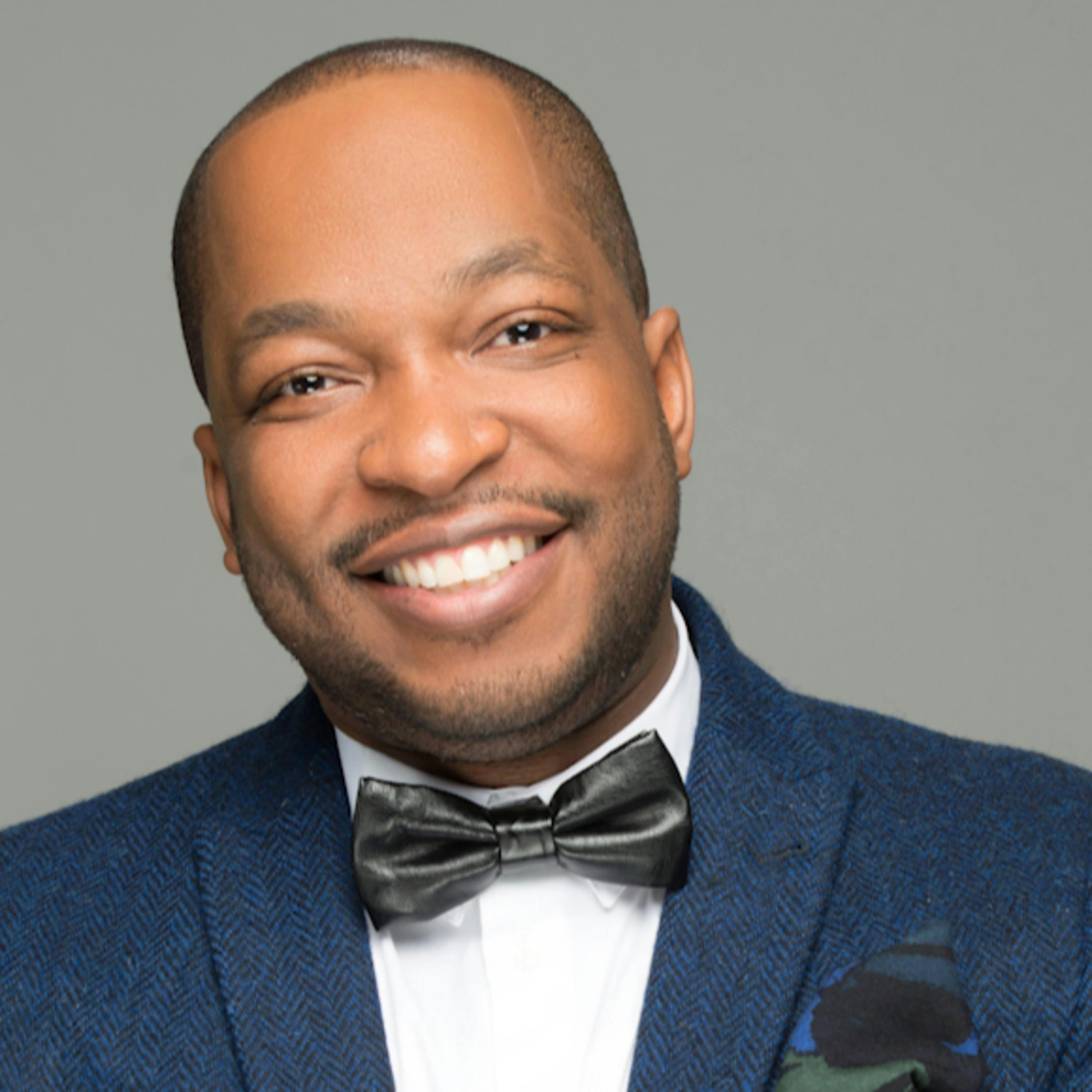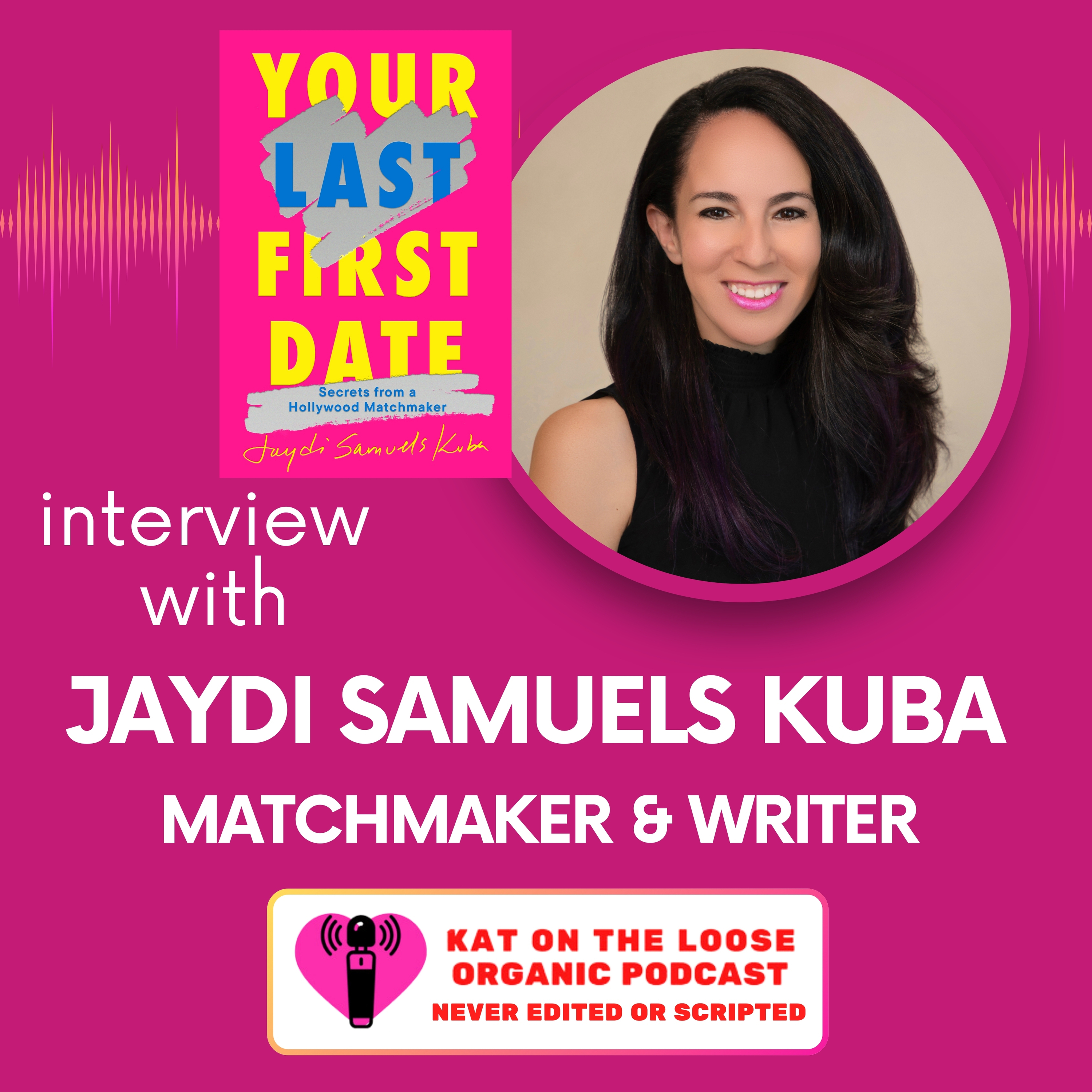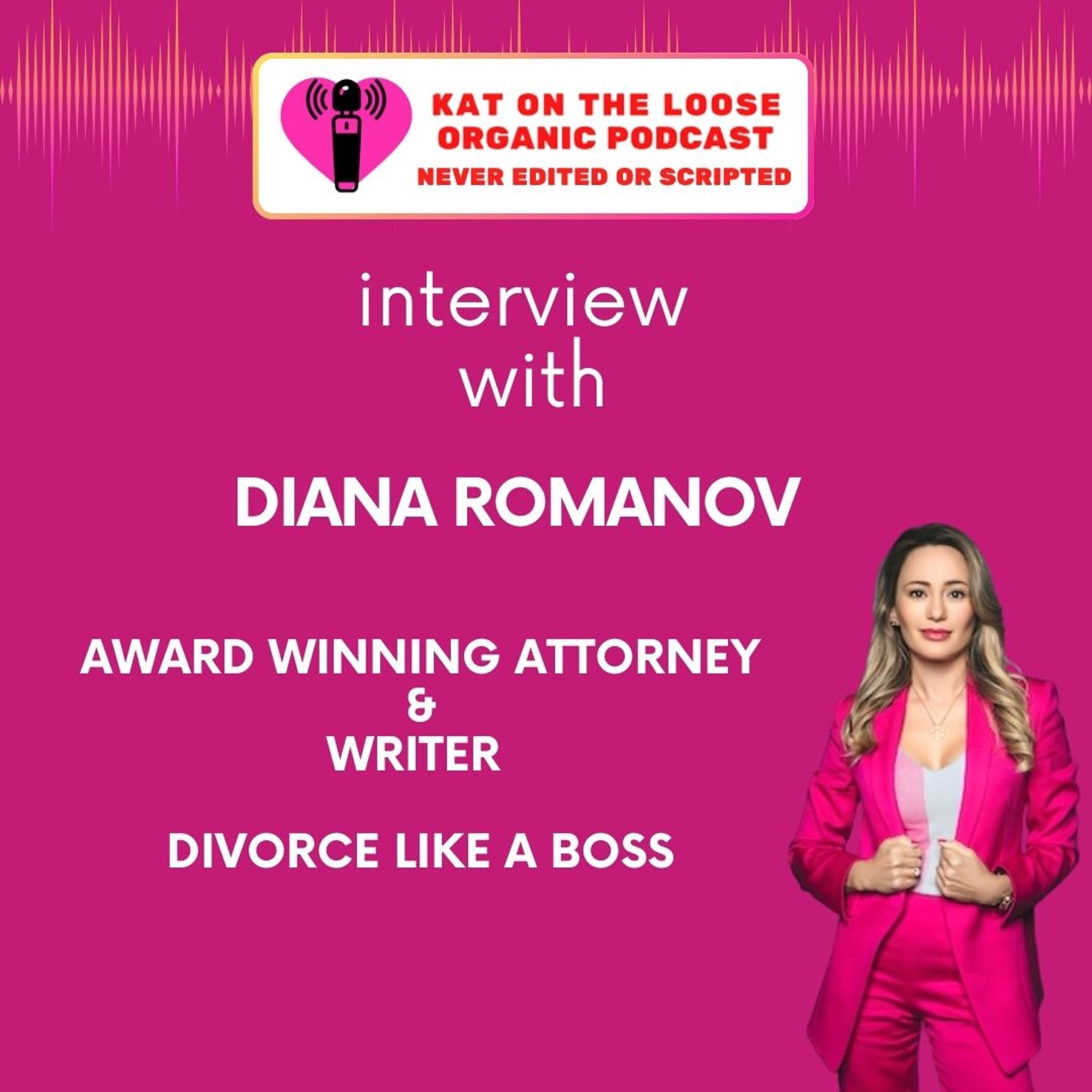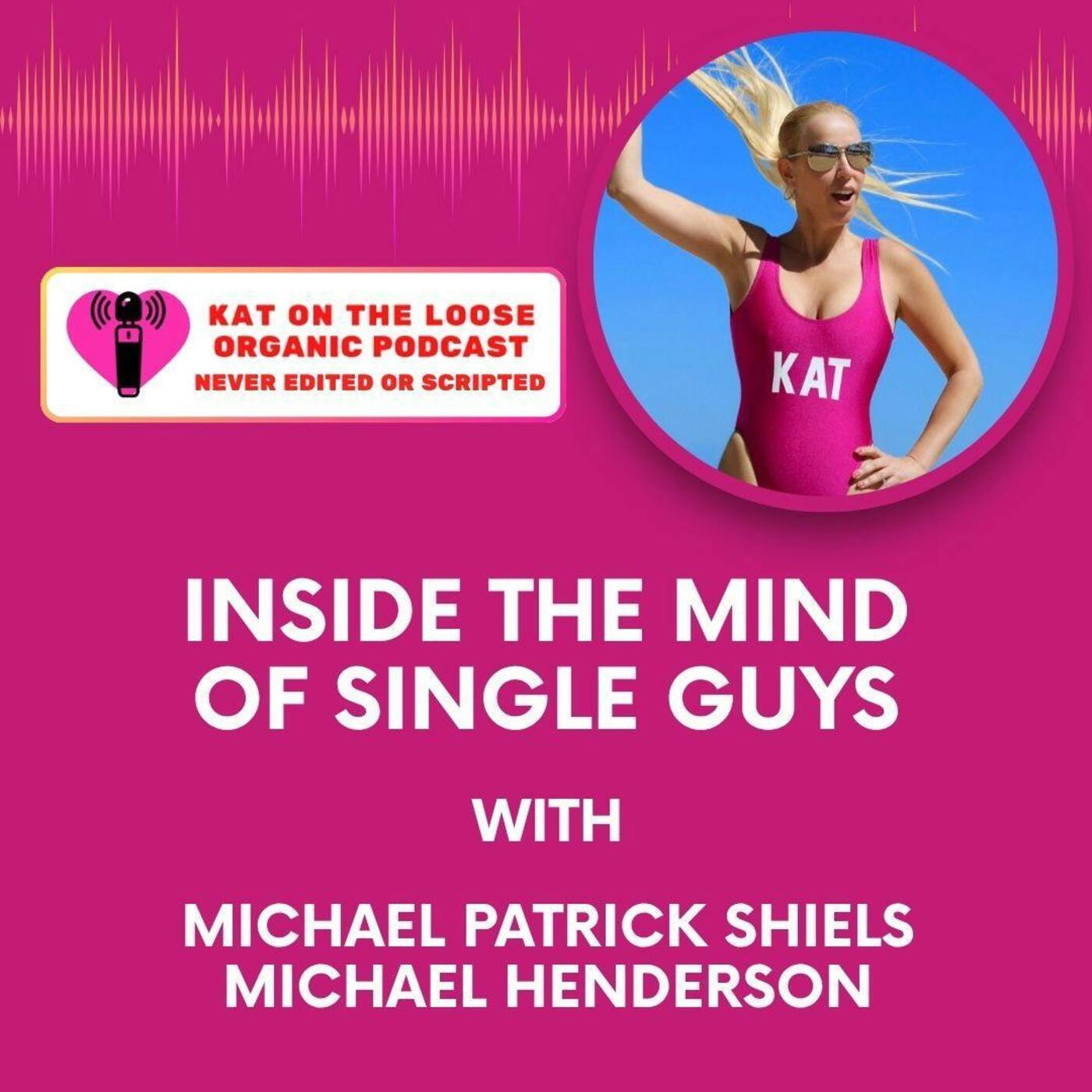INTERVIEW WITH WESLEY WILLIS - THE NURSE DOC
---
Send in a voice message: https://podcasters.spotify.com/pod/show/katherine-zammuto/message
Learn more about your ad choices. Visit megaphone.fm/adchoices
Press play and read along
Transcript
Speaker 1
Hi guys, welcome to Cat on the Loose. This week I am so excited.
Our guest is
Speaker 1 Wesley Willis, and I'm going to let him explain to us why he's called the nurse doc.
Speaker 1 And he's here live via Zoom. Hi,
Speaker 1 Wesley, right?
Speaker 2 Yes.
Speaker 1 Thank you so much.
Speaker 1 So explain to us why people call you the nurse doc.
Speaker 2 Okay, so yeah, I'm called the nurse doc because, so by education and training, I am a registered nurse and I'm also a psychologist. So I have a doctorate of psychology.
Speaker 2 So a few years ago, a patient of mine was like, well, why don't you call yourself a doctor? I was like, well, because I was a nurse first.
Speaker 2
They was like, well, maybe you should just call yourself nurse and then doc. And I was like, okay, I like the sound of that.
Why not? Let's go with it.
Speaker 1
That makes sense. Sounds great.
But how did you end up
Speaker 1 working with couples? And maybe if you can explain to us, a lot of people, I guess a lot of my viewers are like me. They don't really understand where cognitive behavior therapy is.
Speaker 1 Can you explain to us?
Speaker 2 Yeah, the way that I got to working with couples was prior to that, when I started my career in mental health and treating patients, I started out as actually a trauma therapist.
Speaker 2 After several years of really that being
Speaker 2 overwhelming, because it can be overwhelming working with patients who were sexually abused and violated and all of those things. You get like kind of sometimes emotionally drained.
Speaker 2 So I was at the point where I got burnt out. So I went and did some postdoc studies and marital and family therapy because even
Speaker 2 in terms of like with working with trauma, I think it's all about relationships. Also, I always believed in the power of relationships and that being important in people's mental health.
Speaker 2 So that's how I got into treat like as a relationship therapist. And that's been the bulk of my practice for a few years now.
Speaker 2 And so as a CBT practitioner, working as a cognitive behavioral therapist practitioner, I've always found it to be so useful for patients to set goals and also have, you know, kind of like have measurable things in their life to where they get to.
Speaker 2 And never any pun to my
Speaker 2 psychotherapist colleagues who practice other modalities.
Speaker 2 I just found that cognitive behavioral therapy, I found that my patients were getting better sooner and actually at the same time transitioning out of therapy and I think that that's what I think that that's what therapy is about is be is getting in there get working on some really skills tools and CBT does that so that patients can kind of move on and do things better in their life whatever their issues were
Speaker 2 by getting to those goals it's also
Speaker 2 yeah sorry go ahead go ahead go ahead no no no no no no it sounds really really interesting but is it just for couples or or singles too Yep, CBT can be treated for a whole host of issues and diagnoses.
Speaker 2 So singles, we've treated, we use CBT to treat young adults. My practice, I don't treat children under the age of 13.
Speaker 2 And so, so, yeah, so children, adults, families, what it hasn't shown to be very effective with is individuals with personality disorder.
Speaker 2 And those being individuals who have things like narcissistic personality disorder borderline personality disorder because they have um because they're quite more challenging and the other model modalities have shown to be more effective and how do you think someone figures out that they would benefit from it
Speaker 2 So I think one of the things that I do in my practice is I explain it from patients very at the very beginning.
Speaker 2 I'm like, hey guys, you know, when you come in, you're going to be responsible for doing homework and journaling and reading.
Speaker 2 and that's what CBT is really about because patients get to spend 45 more 45 minutes with me but they live with themselves for 24 hours a day seven days right
Speaker 2 exactly so yeah so I tell them at the very beginning hey if you are someone who really doesn't want to be uh really committed by doing these really uh sometimes what people feel is like a chore
Speaker 1 then this is not going to be the right type of work for you oh okay no yeah so how long does it usually take how long do you you work with people usually?
Speaker 2 So, typically, my patients are in my practice eight to ten months. They start out typically weekly and then they go to bi-weekly.
Speaker 2 After we see some symptoms decrease in terms of like emotions, like rage, anger, sadness, and then hopefully, like kind of like maintenance, it's up until the end.
Speaker 1
Oh, wow, sounds amazing. You deal with everything.
Now, do you think there are any secrets or any key points that you tell your patients, your clients in regards to having a long-lasting relationship
Speaker 2 those definitely uh that communication is key i always tell my patients at the very beginning you don't even have to know the first the three things sex money or communication is the problem really
Speaker 2 i know
Speaker 2 it's kind of like that simple uh so those are going to be one of the three things that i know is i already can know that is going to be the issue um and then kind of like tuning in listening to kind of like that inner voice when things are going on, like arguments, and also owning that, I think, is like the key to, is the key to say, you know what, honey, I heard you say, and it really like offended me.
Speaker 2 And I wanna make sure that you meant that.
Speaker 2 Because sometimes, a lot of times, not even sometimes, a lot of times, what we hear or what we thought we heard isn't what how the person intended.
Speaker 2 And when we're in relationships, hurt feelings, you know, kind of go on like from month to month to year to year. Yes,
Speaker 1 it's so true. Yeah.
Speaker 2 Start talking about it. It kind of permeates the way we think and the way we hear from our partner.
Speaker 1 But how do you fix that? You said, yeah, I think that's what most people complain about. Sex, money, and communication.
Speaker 1 Like, for example, now during the pandemic, a lot of couples are home spending a ton of time together, even boyfriends and girlfriends, and money is tight for a lot of families.
Speaker 1 How do you fix that in this craziness or can you at least start getting in the process of fixing it?
Speaker 2 So in my practice, we go through like several cognitive distorted thoughts that are kind of common.
Speaker 2 And I guess somebody would say that what's common. So we do things like talk about magical thinking, mind reading.
Speaker 2 We talk about things like dichotomous thinking, like you either love me or you hate me. So it can be no gray areas.
Speaker 2 So when we kind of identify like those what what we call schemas or challenging kind of thought patterns that people create, then we start kind of like talking about, well, what kind of emotion
Speaker 2 does that hear when you think, hey, my partner is speaking for me? Or that, you know, that I'm mind reading my partner. So, oh, she's not going to believe what I would say.
Speaker 2 So I just choose not to say that to her.
Speaker 2 So we talk about things like anxiety that comes up before that and talk about, well, how great was that anxiety that if you talked to your wife about the fact that she wanted to buy a new car or that you bought a new car uh that she would be upset well 90 well what made you think something like that well she's acted like that before
Speaker 2 well okay she's acted like that before tell me more you know and so then they kind of get to like you know what She's like my biggest cheerleader. I really owed it to her.
Speaker 2 And she probably would have said, hey, yeah. But now we have this whole big argument because I chose to keep it a secret because I was afraid of how she would react.
Speaker 1 I see. So you do think it's possible to get through this pandemic without getting divorced?
Speaker 2 Yes, I do. Very much so.
Speaker 1
I have a lot of friends that they just pretty much gave up on the marriage. They're like, I can't handle it.
Now, how about single people?
Speaker 1 I know there are also a lot of single people who have been struggling with depression, with sadness, with loneliness, or like just fighting with their boyfriends and girlfriends.
Speaker 1 What would you suggest? Because communication is a little harder, right? When you don't live with a person every day,
Speaker 2 exactly, exactly. Well, I feel like even singles are even actually even better, are much more fun
Speaker 2 because you get to kind of the because they get to kind of like set the pace for their relationship, talk about their do's and their don'ts in a relationship. Like, is it okay to use my toothbrush?
Speaker 2 Is it not okay to use my toothbrush?
Speaker 2 Is it okay to, you know, especially in the age of social media, is it okay to get DMs from you know someone of the opposite sex or or to go out to a party with a a friend of the opposite sex so they get to kind of like put those kind of things down as opposed to kind of before the uh after they got to the altar they just kind of automatically assumed you knew like what do you mean you didn't think it would be a problem if you was getting a text message from a pretty girl on your dms um so singles i feel like get to get to kind of like uh plan it out a whole lot more especially which is what cognitive behavioral therapy gets to do um and so in terms of like the sadness and the depression it's just like talk about that inner voice so So, what's telling you, you know, kind of like that you're sad or what makes you recognize that.
Speaker 2 And hopefully, most times people can recognize, well, you know, I don't have a girlfriend or I don't have a boyfriend or I feel really lonely.
Speaker 2 And then after you kind of help them break through those things, like learning how to be grateful and meditation and mindfulness, they realize, actually, you know what, I always had somebody all the time, but they don't love me in that way.
Speaker 2 Well, what if you talk to them about because people can't just automatically read your mind as much as you would love love for them to be able to
Speaker 1 that is so true yeah most of the time we just don't say what we think and then we don't understand why the other person doesn't understand us right
Speaker 1 exactly exactly 150 that makes so much sense now do you think online dating and dating apps which now are being used more than ever before the pandemia they were already popular but now this year they like exploded do you think they make dating easier or they actually make dating more complicated
Speaker 2 i mean that's a good question i think it does make uh i think it does make it a bit more complicated uh one because i just think about kind of like patients that i've been seeing who have been doing the online dating a whole lot probably more so uh than before and they're in their heads so much uh and i especially i feel like i'm not a millennial uh
Speaker 2 you know they talk about things like oh i don't want to reach out to him because I feel like I'm doing too much, or he may think I'm thirsty, or she may think I'm overly zealous.
Speaker 2 Well, what made you say that?
Speaker 2 You know, versus actually asking the person, hey, you know, I, you know, I sent your text message a couple of days ago, and you know, I didn't get a response right away.
Speaker 2 So I'm just checking in, is everything okay? Versus saying, oh, they're not interested, or all of those other things. So, again, like what we say, we're always in our hands.
Speaker 2 So I think it's made it so much more complex and so much more complicated than it has to be.
Speaker 1 I think I agree with you.
Speaker 1 So what would you say to those who are listening to us and they think they might benefit from therapy, they might benefit from your cognitive behavior therapy, but they're intimidated or they're shy, they don't know exactly how it is.
Speaker 1 What would you say to these people? Like, how do you take the first step?
Speaker 2 Well, I think the first step is so readily available nowadays. Yeah.
Speaker 2 So I've been a teletherapist for three years. So
Speaker 2 even before COVID, I was doing therapy via video and I think it's exploded in terms of the access for people and the insurance.
Speaker 2 So definitely shop around, go on things like Psychology Today and all of these other great platforms
Speaker 2 that are coming out. And don't be afraid to say, you know what, this is what I think I would benefit from.
Speaker 2 Or this is what I don't think will work for me.
Speaker 2 You know, sometimes people are like, you know,
Speaker 2 I don't want a I want a therapist who's interactive versus somebody who says,
Speaker 2 how does that make you feel?
Speaker 2 And kind of like detached. So don't be afraid to say what you need because that's what we're here for.
Speaker 2
And therapists, just like your partner, your spouse, your boyfriend, girlfriend, we can't read your mind. We would love to.
We'd all be rich.
Speaker 1 I know, right?
Speaker 1 So how do people obviously you do this therapy online?
Speaker 1 So anybody, anywhere in the United States, that's great even before covet it was great but now i think a lot of people still want to do it from home so you can schedule a meeting with you like we're doing now via zoom
Speaker 1 so it doesn't really matter where people are based you can do it from home from the comfort of your home and tell people how do they reach you have a podcast yourself right yes i do it's super cool by the way guys i have a weird thing actually so i've been a streamer because since i was like okay three years ago I bought these cameras and and mics and stuff like that.
Speaker 2 So I started YouTubing. So I'm a YouTuber and I've like created like over a hundred different videos in terms of live streaming talking about kind of relationship issues, mental health stuff,
Speaker 2 and tips from like guest experts and by myself.
Speaker 2 And then I kind of branched out into the podcast because several listeners was like, hey, Doc, I like listening to what you have to say, but I don't like having to be committed to watching it on YouTube.
Speaker 2 I I wouldn't like putting on YouTube.
Speaker 1 So, people have the option.
Speaker 1
Yeah, no, I did watch your videos. They are super, super cool, but I love your podcast.
I think it's fabulous.
Speaker 1 Can you tell people what your Instagram and the name of your podcast and everything so they can find you?
Speaker 2 Yep. So, my Instagram is the nurse doc.
Speaker 1 So, the nurse doc. I love that name.
Speaker 2 So, that's my Instagram and my Twitter and like my Facebook.
Speaker 2 And my podcast is on iTunes, Apple Podcasts, and those sources, the relationship talk with the nurse doc.
Speaker 1 And you drop new episodes every week?
Speaker 2 Yep,
Speaker 2 every Friday morning. I typically have on things like a guest, like a transformation coach,
Speaker 2 individuals like this past month.
Speaker 2 We find ourselves sometimes, unfortunately, caught up in domestically violent or...
Speaker 1 Oh, yeah, I heard that one. Yeah, that was super nice.
Speaker 1 podcasts and videos talking about domestic violence and intimate partner violence yeah i did listen and i thought that was super cool that you mentioned that because we here my podcast is usually very light and we joke about bad dates and good dates and bad relationships but yeah there is the the dark side of uh abuse and and and mental abuse physical abuse so if anybody out there listening that is super important that they feel that they can reach out and talk to an expert.
Speaker 1
So fantastic. I am most definitely not an expert, but you are.
So if anybody out there has like more serious issues, I think you are a great guy that they can talk to.
Speaker 1 I have a feeling you're going to end up on TV with your own relationship talk show because you have all the looks and you're great. And I love your videos and I love all your episodes.
Speaker 2 Well, thank you so, so very much. I really, I really appreciate that.
Speaker 2
It's been a fun journey. I never would have thought like, as a young kid, that this would be kind of like where I was, but I love my patients.
I love their stories.
Speaker 2 And helping to see them kind of like grow just like really makes my day.
Speaker 1 I think it must make a lot of difference. So, guys, if you want to know more about cognitive behavior therapy or more about his work,
Speaker 1 take a look at his Instagram. It's super, super interesting, The Nurse Doc.
Speaker 1
And I love your podcast. I totally recommend it.
Thank you so much for spending this Monday with us. I really appreciate it.
Speaker 1 And I know I'm going to be flooded with questions because usually after I drop the episode, that's when questions come. So I will most definitely invite you to come back if you can.
Speaker 2 Awesome. I'm looking forward to it.
Speaker 1
Thank you so much, Wesley. Have a great week.
The Norse Doc, guys.
Speaker 2 Yeah, thank you.





